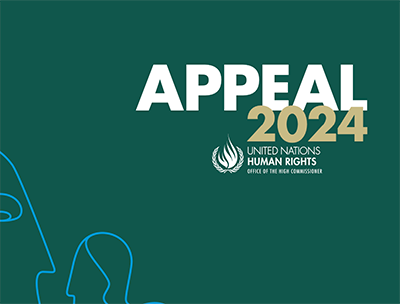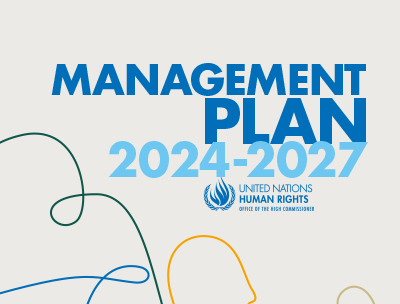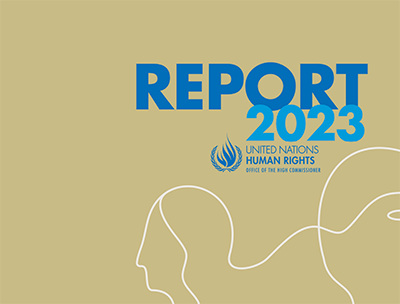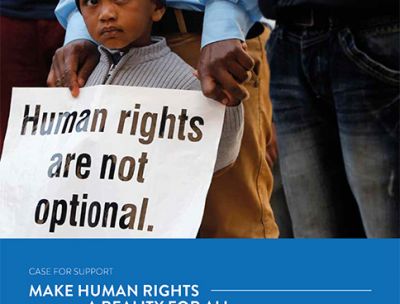OHCHR’s Funding and budget
Latest ten voluntary contributions to OHCHR in 2024
(as at 31 October, in chronological order from oldest to newest)
| Donor | Amount in currency | Amount in US$ |
| Estonia | EUR 65,000 | 72'707 |
| Uruguay | - | 30'000 |
| Switzerland | CHF 1,000,000 | 1'111'111 |
| Inditex | EUR 100,000 | 109'409 |
| Kuwait | - | 22'600 |
| Denmark | DKK 5,000,000 | 749'963 |
| Germany | EUR 63,170 | 69'114 |
| Germany | EUR 105,000 | 114'880 |
| Switzerland | - | 330'000 |
| Mexico | MXN 167,555 | 8'359 |
View complete list of voluntary contributions to OHCHR in 2024 (PDF)
Funding
UN Human Rights’ income has two components: the UN regular budget, representing around 40 per cent, and voluntary contributions from Member States and other donors, representing around 60 per cent.
The UN regular budget, approved by the General Assembly, is funded by “assessed contributions” from each Member State. These are determined by a formula that takes into account the size and strength of their respective national economies.
Human rights get a tiny part of UN regular budget: only 5%
The UN regular budget should finance all activities mandated by the General Assembly and its subsidiary organs, including the Human Rights Council. Human rights are Charter responsibilities, recognized as one of the three pillars of the UN system, the other two being development, and peace and security. While the Secretary-General has clearly underscored the centrality of human rights to the work of the entire UN Secretariat, the regular budget allocated to human rights is highly limited.
The regular budget submission for the Office for 2024 is US$192.2 million, which represents just over five per cent of the total UN regular budget. UN Human Rights relies heavily on voluntary contributions.
In previous years, the regular budget reflected “zero growth”, as well as a number of across the-board reductions decided by the General Assembly. In reality, this means that the resources allocated from the regular budget to human rights are in decline: official human rights mandates continue to grow in number and scope, and Member States have formally requested consideration of an increase in the budget share for human rights. As a result, the Office has proposed, in its 2024 regular budget submission, an increase of US$9.5 million to strengthen the Office’s capacity and the support in the implementation of mandated activities. At present, UN Human Rights continues to rely heavily on voluntary contributions to finance at least 20 per cent of the mandated activities that should be financed by the regular budget, primarily treaty body and special procedures work.
In a world facing increasing threats to human rights, relying on such limited UN regular budget resources is simply not adequate. This is why we will need to continue to count on support for extra-budgetary funding through voluntary contributions from a range of funding partners such as Member States, foundations, and the corporate sector.
Only 30% of extrabudgetary contributions are unearmarked
In 2023, the Office received US$281.5 million in extra-budgetary contributions. This represents an increase of approximately 16.9%, compared to the 2022 total of US$240.8 million. This is the highest annual amount that UN Human Rights has received to date. Nevertheless, the total amount of extrabudgetary contributions falls far short of the US$452.4 million in extrabudgetary requirements that were outlined in the 2023. Of these contributions, 30 per cent are unearmarked (corresponding to an amount of US$84.4 million). While all contributions are gratefully appreciated, the level of earmarking remains high and makes it difficult for the Office to efficiently implement the OMP. It also means reduced flexibility, higher transactional costs and constraints on the Office’s ability to effectively respond to emerging needs.
In 2023, 55.4 per cent of total expenditures (US$439.9 million), including regular budget and voluntary contributions, were devoted to field work and headquarters support for the field, in particular for capacity-strengthening projects and human rights monitoring, which were predominantly financed through voluntary contributions. The graph below summarizes the Office’s expenditures by main activity:
Only 33% of extrabudgetary contributions are unearmarked
In 2022, the Office received US$240.8 million in extra-budgetary contributions. This represents an increase of 5.8 per cent, compared to the 2021 total of US$227.7 million. This is the highest annual amount that UN Human Rights has received to date. Nevertheless, the total amount of extrabudgetary contributions falls far short of the US$400.6 million in extrabudgetary requirements that were outlined in the 2022. Of these contributions, 33 per cent are unearmarked (corresponding to an amount of US$79.9 million), a decrease of 4 per cent compared to 2021. While all contributions are gratefully appreciated, the level of earmarking remains high and makes it difficult for the Office to efficiently implement the OMP. It also means reduced flexibility, higher transactional costs and constraints on the Office’s ability to effectively respond to emerging needs.
In 2022, 54.7 per cent of total expenditures (US$378.1 million), including regular budget and voluntary contributions, were devoted to fieldwork and headquarters support for the field, in particular for capacity-strengthening projects and human rights monitoring, which were predominantly financed through voluntary contributions. The graph below summarizes the Office’s expenditures by main activity:
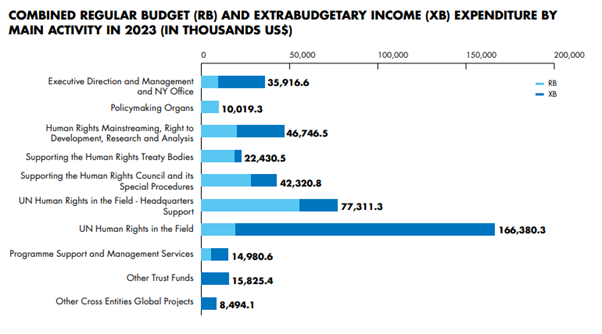
Financial requirements in 2024
Total extra-budgetary resources needed for 2024 amount to US$500 million. These are the funds the Office requires, in addition to the regular budget allocation, to be able to address all assistance needs, both requests received or those we have identified.
Rather than limiting ourselves to operating budgets, OHCHR’s Annual Appeal represents the full extent of our financial requirements and their justification. At the same time, this overall budget remains limited to what can realistically be implemented within a single year. For this reason, some increases, notably in the field, remain modest. Expanding the reach of field presences requires a steady build-up of human resources and predictable budgets over time that allow for sustained growth and an effective operational critical mass.
To enable the Office to deliver on its broad mandate of achieving human rights for all with independence, we must secure predictable, flexible and sustainable funding through unearmarked and multi-year contributions.
While all contributions are much appreciated, the ongoing trend toward earmarking constrains the effectiveness and agility of the Office to allocate resources where they are most urgently required and demands constant budgetary adjustments over the year. Early payment is also critical as it helps to mitigate cash flow constraints during the year. Despite the generosity of our partners over the years, human rights work has remained drastically underfunded. Meeting the increasing demands requires greater financial support from a diverse funding base including Member States and other funding partners and the Office will continue to engage actively and explore opportunities to tap into new and additional funding sources, and advocate for flexible and multi-year contributions.
